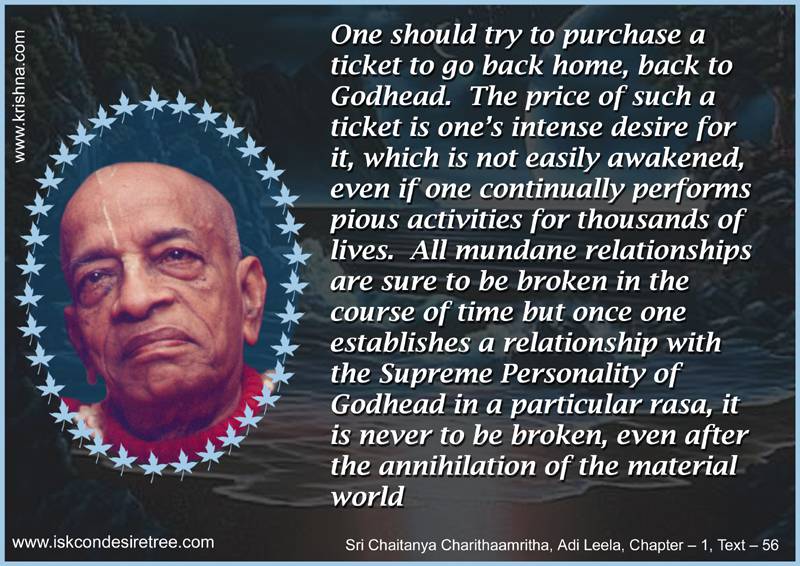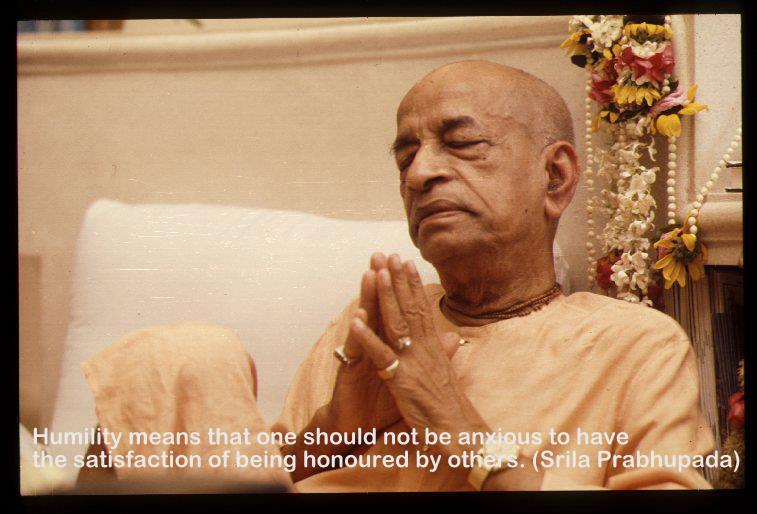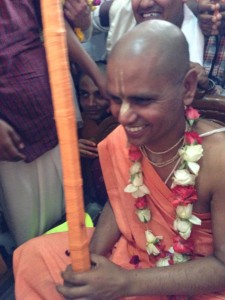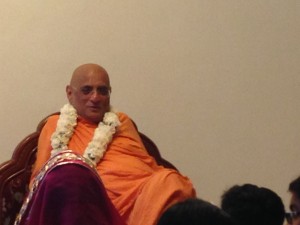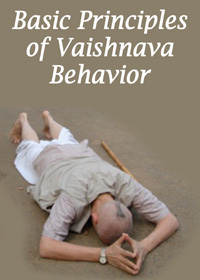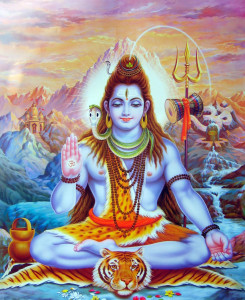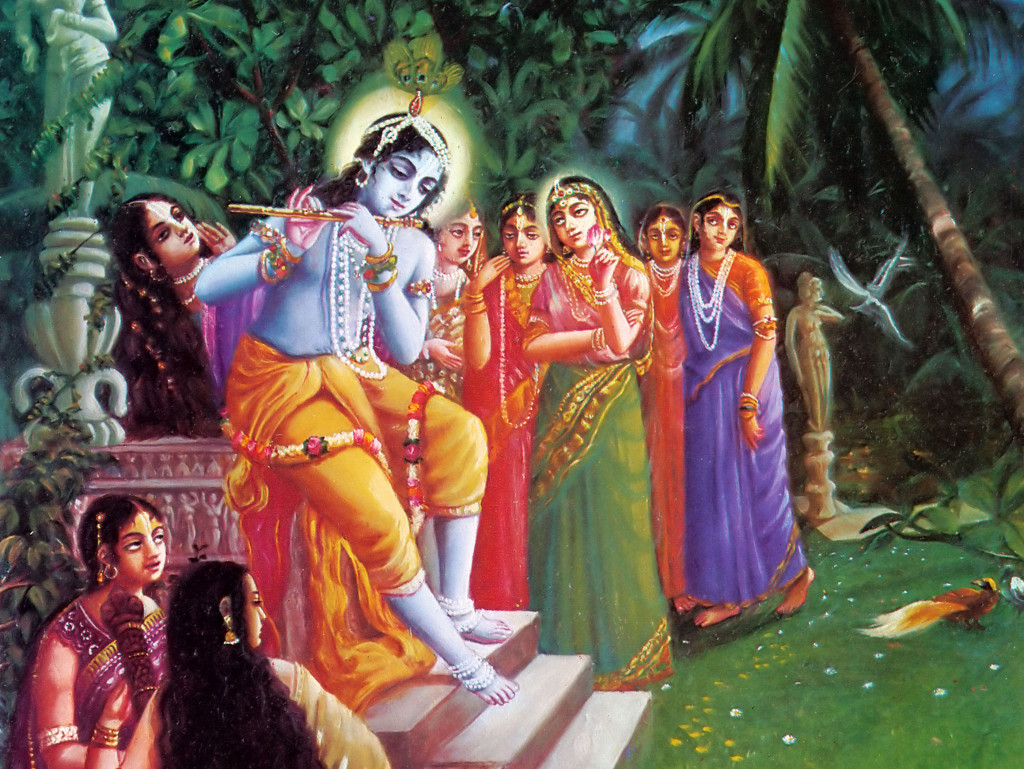Hare Krishna.
21st Feb, 2015, Gurgaon
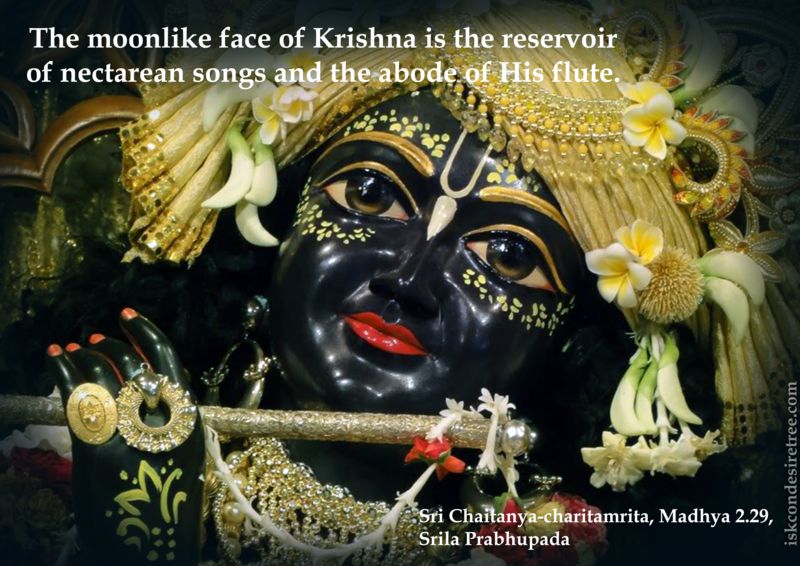
A few days back I heard the below verse from Sri Brahma Samhita and a brief commentary by HH Tamal Krishna Goswami Maharaj. The sweet description of Krishna’s flutes somehow inspired me to search more on it and write this blog for the pleasure of devotees. As I searched for the matter I became intoxicated with Krishna’s flute, I never knew such sweet pastimes happened because of it. Srila Prabhupada writes in Nectar of Devotion, Chapter 26, that “As far as Krishna’s flute is concerned, it is said that the vibration of this wonderful instrument was able to break the meditation of the greatest sages. Krishna was thus challenging Cupid by advertising His transcendental glories all over the world.”
veṇuṁ kvaṇantam aravinda-dalāyatākṣam-barhāvataṁsam asitāmbuda-sundarāṅgam
kandarpa-koṭi-kamanīya-viśeṣa-śobhaṁ govindam ādi-puruṣaṁ tam ahaṁ bhajāmi
I worship Govinda, the primeval Lord, who is adept in playing on His flute, with blooming eyes like lotus petals with head decked with peacock’s feather, with the figure of beauty tinged with the hue of blue clouds, and His unique loveliness charming millions of Cupids. ( BS 5.30)
Krishna’s playing of flute is indeed very special and much has been written about it in various vedic scriptures and poems.
Krishna has different flutes and He plays different melodies for different purposes. There are three kinds of flutes used by Krishna (NoD chapter 26)
1) Venu : This is a very small, not more than six inches long, with six holes for whistling.
2) Murali: Murali is about eighteen inches long with a hole at the end and four holes on the body of the flute. This kind of flute produces a very enchanting sound.
3) Vamsi: The vamsi flute is about fifteen inches long, with nine holes on its body.
Krishna would play on any of these three flutes when they were needed. Krishna uses the Venu flute to attract to Gopis, like Venum kvanantam from the Brahma Samhita.
These flutes were sometimes bedecked with jewels. Sometimes they were made of marble and sometimes of hollow bamboo. When the flute is made of jewels it is called sammohini. When made of gold, it is called akarsini.
It said that Krishna plays different tunes
1) Demigods like Lord Brahma and Lord Siva’s meditation is broken and they forget everything in astonishment and Lord Anantadeva sways His head like in hypnosis.
2) Second tune makes the Yamuna flow backwards
3) Third tune makes the moon stop moving
4) Fourth tune makes the cows run to Krsna and get stunned listening to the flute
5) The 5th note attracts the gopis and make them come running to him
6) 6th Tune makes the stones melt and creates autumn season
7) 7th note manifests all seasons
8) 8th Note is meant exclusively for Srimati Radharani, it takes Her name and calls for Her, and She comes running to Him putting Her cloth wrong and mascara also.
Krishna has another flute named Mahananda, which is like a fishook that captures the fish of Srimati Radharani’s heart and mind. Another flute, which has six holes is known as Madanajhankrti. Krishna’s flute named Sarala makes a low, soft tone like the sound of a softly singing cuckoo. Krishna is very fond of playing this flute in the ragas gaudi and garjari. (Radha-Krishna-ganoddesha-dipika text 122,123)
In one of lectures HH Loknath Maharaj said that the interesting part of Krishna’s flute playing is that the sound can be heard only by the party for whom it is being played. If Krishna plays flute for the gopis, only gopis would be able to hear it, and no one else. If He plays flute for the cows, only the cows would be able to hear it, and no one else. We don’t have that potency, our music cannot be restricted for any one party but when the supreme Lord Krishna plays flute, He can choose and restrict His audience. For example, when the gopis hear the sound of Krishna’s flute, they abruptly leave their household chores in the middle and run out. Other family members can’t comprehend suddenly what happened to the gopis and where they are going. Sometimes the roti is cooked half way on the stove and the gopi hears Krishna’s flute. She runs out leaving the husband waiting for the roti to arrive in his plate. But the husband can’t hear the flute. Only Krishna can do this.
For cows, Krishna sits atop a tree and plays flute to keep a check on the number of 9 hundred thousand cows herding with Him. Before returning home, He calls each and every one of the cow by her name – through the sound of His flute. He calls all of them one by one – Chandrika, Dhavali, Ivali..When He playes flute for Chandrika cow, only Chandrika is able to hear her name through the sound of Krishna’s flute. She gets delighted to hear her name being called by Krishna and comes running towards Him. Then He calls Dhavli, Ivali and every other cow in the same way. Thus no cow is left behind.
Krishna is uniquely called Venugopal, Bansilal, Murali, Muralidhar, etc. based solely on His relationship with His flute !
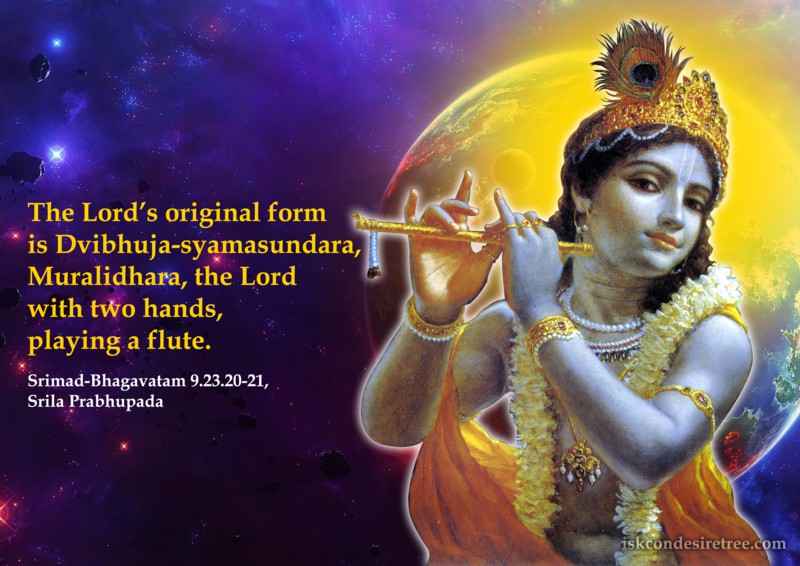
Let me share two instances where the special taste of Lord’s flute is relished by Caitanya Mahāprabhu in Śrī Caitanya-caritāmṛta.
The first instance is from madhya Lila chapter 21 which is aptly titled `The Opulence and Sweetness of Lord Śrī Kṛṣṇa’. Mahaprabhu is explaining Sri Sanatana Goswami about the sweetness of Krishna’s face, His smile and then His lips and finally describes … His flute !
The sound of Kṛṣṇa’s flute spreads in the four directions. Even though Kṛṣṇa vibrates His flute within this universe, its sound pierces the universal covering and goes to the spiritual sky. Thus the vibration enters the ears of all inhabitants. It especially enters Goloka Vṛndāvana-dhāma and attracts the minds of the young damsels of Vrajabhūmi, bringing them forcibly to where Kṛṣṇa is present. (CC Madhya 21.141)
“The vibration of Kṛṣṇa’s flute is very aggressive, and it breaks the vows of all chaste women. Indeed, its vibration takes them forcibly from the laps of their husbands. The vibration of His flute attracts even the goddesses of fortune in the Vaikuṇṭha planets, to say nothing of the poor damsels of Vṛndāvana. (CC Madhya 21.142)
“The vibration of His flute is just like a bird that creates a nest within the ears of the gopīs and always remains prominent there, not allowing any other sound to enter their ears. Indeed, the gopīs cannot hear anything else, nor are they able to concentrate on anything else, not even to give a suitable reply. Such are the effects of the vibration of Lord Kṛṣṇa’s flute.” (CC Madhya 21.142)
The second instance one is in Antya lila chapter 16 titled `Lord Śrī Caitanya Mahāprabhu Tastes Nectar from the Lips of Lord Śrī Kṛṣṇa’ ! One evening after honouring Jagannnath prasadam Mahaprabhu became ecstatic. In ecstatic love, Śrī Caitanya Mahāprabhu ordered Rāmānanda Rāya to recite some verses. Thus Rāmānanda Rāya spoke as follows.
‘O hero of charity, please deliver unto us the nectar of Your lips. That nectar increases lusty desires for enjoyment and diminishes lamentation in the material world. Kindly give us the nectar of Your lips, which are touched by Your transcendentally vibrating flute, for that nectar makes all human beings forget all other attachments.’ Upon hearing Rāmānanda Rāya quote this verse, Śrī Caitanya Mahāprabhu was very satisfied. Then He recited the following verse, which had been spoken by Śrīmatī Rādhārāṇī in great anxiety. (CC Antya 16.117-118)
‘My dear friend, the all-surpassing nectar from the lips of the Supreme Personality of Godhead, Kṛṣṇa, can be obtained only after many, many pious activities. For the beautiful gopīs of Vṛndāvana, that nectar vanquishes the desire for all other tastes. Madana-mohana always chews pan that surpasses the nectar of heaven. He is certainly increasing the desires of My tongue.’ After saying this, Śrī Caitanya Mahāprabhu was overwhelmed by ecstatic loving emotions. Talking like a madman, He began to explain the meaning of the two verses. (CC Antya 16.119-120)
“My dear lover,” Lord Caitanya said in the mood of Śrīmatī Rādhārāṇī, “let Me describe some of the characteristics of Your transcendental lips. They agitate the mind and body of everyone, they increase lusty desires for enjoyment, they destroy the burden of material happiness and lamentation, and they make one forget all material tastes. The whole world falls under their control. They vanquish shame, religion and patience, especially in women. Indeed, they inspire madness in the minds of all women. Your lips increase the greed of the tongue and thus attract it. Considering all this, We see that the activities of Your transcendental lips are always paradoxical. (CC Antya 16.121-122)
“My dear Kṛṣṇa, since You are a male, it is not very extraordinary that the attraction of Your lips can disturb the minds of women. But I am ashamed to say that Your impudent lips sometimes attract even Your flute, which is also considered a male. It likes to drink the nectar of Your lips, and thus it also forgets all other tastes. “Aside from conscious living beings, even unconscious matter is sometimes made conscious by Your lips. Therefore, Your lips are great magicians. Paradoxically, although Your flute is nothing but dry wood, Your lips constantly make it drink their nectar. They create a mind and senses in the dry wooden flute and give it transcendental bliss. “That flute is a very cunning male who drinks again and again the taste of another male’s lips. It advertises its qualities and says to the gopīs, ‘O gopīs, if you are so proud of being women, come forward and enjoy your property — the nectar of the lips of the Supreme Personality of Godhead.’ (CC Antya 16.123-125)
“Thereupon, the flute said angrily to Me, ‘Give up Your shame, fear and religion and come drink the lips of Kṛṣṇa. On that condition, I shall give up my attachment for them. If You do not give up Your shame and fear, however, I shall continuously drink the nectar of Kṛṣṇa’s lips. I am slightly fearful because You also have the right to drink that nectar, but as for the others, I consider them like straw.’ “The nectar of Kṛṣṇa’s lips, combined with the vibration of His flute, attracts all the people of the three worlds. But if we gopīs remain patient out of respect for religious principles, the flute then criticizes us. (CC Antya 16.126-127)
“This flute is nothing but a dry stick of bamboo, but it becomes our master and insults us in so many ways that it forces us into a predicament. What can we do but tolerate it? The mother of a thief cannot cry loudly for justice when the thief is punished. Therefore we simply remain silent. (CC Antya 16.129)

Again Śrī Caitanya Mahāprabhu said to Rāmānanda Rāya, “Please say something. I want to hear.” Understanding the situation, Rāmānanda Rāya recited the following words of the gopīs.
‘My dear gopīs, what auspicious activities must the flute have performed to enjoy the nectar of Kṛṣṇa’s lips independently and leave only a taste for us gopīs, for whom that nectar is actually meant. The forefathers of the flute, the bamboo trees, shed tears of pleasure. His mother, the river on whose bank the bamboo was born, feels jubilation, and therefore her blooming lotus flowers are standing like hair on her body.’ (CC Antya 16.140)
Upon hearing the recitation of this verse, Śrī Caitanya Mahāprabhu became absorbed in ecstatic love, and with a greatly agitated mind He began to explain its meaning like a madman. (CC Antya 16.141)
“Some gopīs said to other gopīs, ‘Just see the astonishing pastimes of Kṛṣṇa, the son of Vrajendra! He will certainly marry all the gopīs of Vṛndāvana. Therefore, the gopīs know for certain that the nectar of Kṛṣṇa’s lips is their own property and cannot be enjoyed by anyone else.
‘My dear gopīs, fully consider how many pious activities this flute performed in his past life. We do not know what places of pilgrimage he visited, what austerities he performed, or what perfect mantra he chanted.
‘This flute is utterly unfit because it is merely a dead bamboo stick. Moreover, it belongs to the male sex. Yet this flute is always drinking the nectar of Kṛṣṇa’s lips, which surpasses nectarean sweetness of every description. Only by hoping for that nectar do the gopīs continue to live.
‘Although the nectar of Kṛṣṇa’s lips is the absolute property of the gopīs, the flute, which is just an insignificant stick, is forcibly drinking that nectar and loudly inviting the gopīs to come drink it also. Just imagine the strength of the flute’s austerities and good fortune! Even great devotees drink the nectar of Kṛṣṇa’s lips after the flute has done so.
‘When Kṛṣṇa takes His bath in universally purifying rivers like the Yamunā and the Ganges of the celestial world, the great personalities of those rivers greedily and jubilantly drink the remnants of the nectarean juice from His lips.
‘Aside from the rivers, the trees standing on the banks like great ascetics and engaging in welfare activities for all living entities drink the nectar of Kṛṣṇa’s lips by drawing water from the river with their roots. We cannot understand why they drink like that.
‘The trees on the bank of the Yamunā and Ganges are always jubilant. They appear to be smiling with their flowers and shedding tears in the form of flowing honey. Just as the forefathers of a Vaiṣṇava son or grandson feel transcendental bliss, the trees feel blissful because the flute is a member of their family.’
“The gopīs considered, ‘The flute is completely unfit for his position. We want to know what kind of austerities the flute executed, so that we may also perform the same austerities. Although the flute is unfit, he is drinking the nectar of Kṛṣṇa’s lips. Seeing this, we qualified gopīs are dying of unhappiness. Therefore, we must consider the austerities the flute underwent in his past life.’ (CC Antya 16. 141-149)
Such is the sweet nectar of pastimes based on Krishna and His flute ! I ended up gathering much more information on the sweet pastimes between Krishna and gopis over His flute than I could squeeze in a single blog. I also read how the flute once told the gopis what all he has gone through to achieve his unique position ! I will share the rest in a future blog.
Right now I can only wish and pray that may we all develop an intense desire to serve and glorify Krishna’s flutes and pray to the lotus feet of His flutes to kindly bless us that we can develop a mere drop of love and attachment which they have for Krishna and His devotees.
All glories to Krishna’s flutes.
All glories to Sri Guru and Sri Gauranga.
All glories to Srila Prabhupada.
Like this:
Like Loading...

